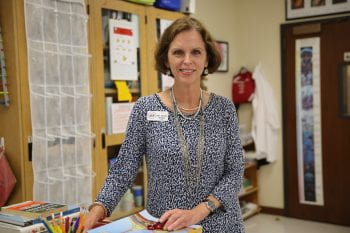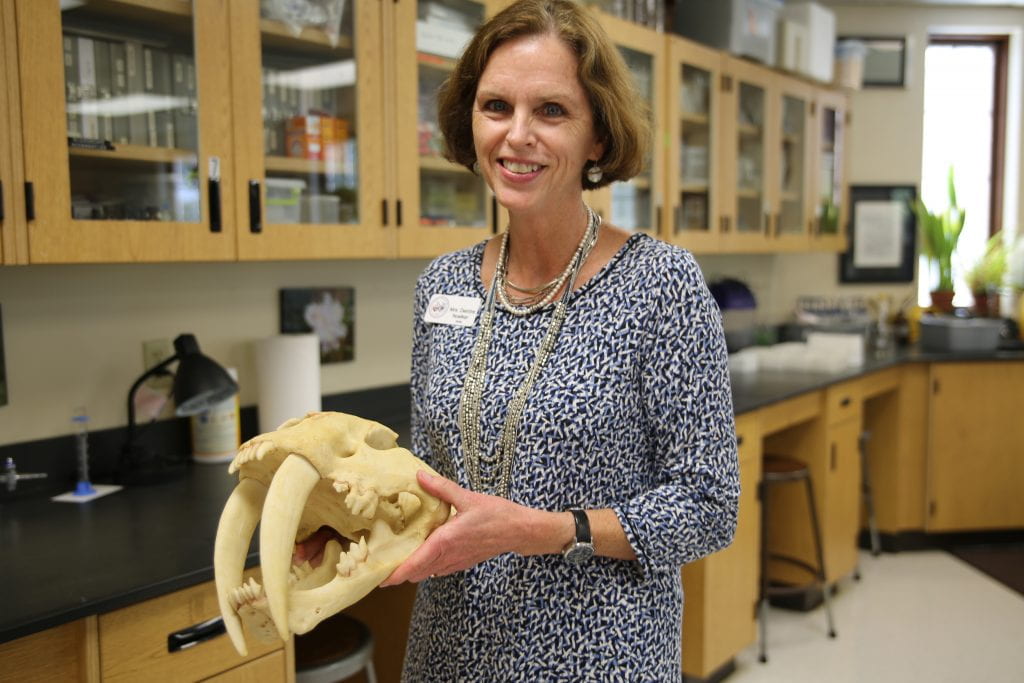Teacher Deirdre “Didi” Noelker climbs up on a stool and grabs an animal skull from atop a cabinet. It’s a replica of a saber-toothed cat. A gift from her husband.
“The more I teach, the more I realize evolution weaves through everything I teach in biology,” says Noelker, as she cradles the skull. “Everything I teach in biology comes back to evolution. It doesn’t matter what subject. We can make a connection in some fashion.”
Noelker, chair of the science department at Villa Duchesne High School, a private, Roman Catholic school in Frontenac, was recently named the Kirk Teacher Fellow for the Institute for School Partnership at Washington University in St. Louis. She will act as an ambassador for evolution education in the St. Louis area. Her goal is to help other teachers understand the importance of teaching evolution and address misconceptions.
A recent Pew Research Center survey on science and society shows that one-third of the population denies evolution. And while some evolution educators have faced resistance from parents, lawmakers and school boards, Noelker has been lucky. She has never experienced any pushback.
“I’ve never, ever had a problem with teaching evolution,” she says. “Not from students, parents, colleagues or school leadership. In fact, evolution is in line with Catholic teachings. It is a big misconception that it’s contradictive.”
Instilling confidence and skills
For many K-12 educators, the topic of evolution can be an intimidating one. However, as the foundation of biology, evolution is a crucial subject to address in the science classroom. With generous support from David Kirk, professor emeritus in the Department of Biology in Arts & Sciences, the ISP works to equip K-12 science teachers with the confidence and skills to teach evolution.

Kirk supplies the books for a monthly evolution education book club, comprised of teachers throughout the area, and he funds a program called Darwin Day, which features workshops, lesson plans and presentations from leading biologists. In addition, he funds the David and Marilyn Kirk Teacher Fellowship.
Noelker is a big fan of the book club. She enjoys the knowledgeable, in-depth discussions. The free books are a bonus.
“I’ve learned more through the book club than many other education ventures I’ve taken part in. Also, I’m building quite a nice library. My husband has a golf library and I have an evolution library,” she adds with a chuckle.
During her tenure, Noelker says she’ll focus on outreach. She wants to bring more teachers into the book club.
“Washington University has this wonderful outreach program for the community, and we need to get more people to understand that it is there and make use of it,” she says.
An explosive field
Noelker “sort of fell into it.” Initially she thought she’d pursue medicine, but marriage and relocation to Washington, D.C, thwarted that. In D.C. she took a job in a research lab at the National Institutes of Health (NIH). After moving back to St. Louis, her husband suggested she teach.
“I recall him saying, ‘You would have a much better schedule if you taught,’” she says. “Silly me, not really realizing how much work was involved in teaching.”
However, she is quick to add that teaching is fun and she still loves it to this day. Her biggest challenge is staying up-to-date with her scientific literacy.
“There is always something new coming down the pike,” she says. “High school biology is a constant challenge of trying to keep up with what is going on. There is so much happening. It’s such an explosive field.”
She tells a funny story about her effort to stay current. She subscribed to a slew of magazines including Science, Science News, Missouri Conservationist and Popular Mechanics. The latter was a mistake – as she meant to subscribe to Popular Science. It was a fortuitous error. She says Popular Mechanics turned out to be really interesting after all, and she was able to share some articles with her students.
September 2017 | by, Myra Lopez
